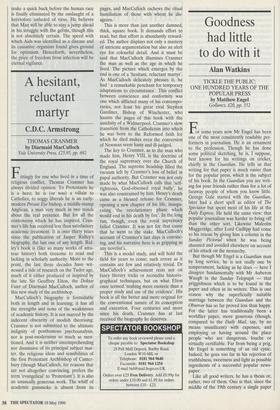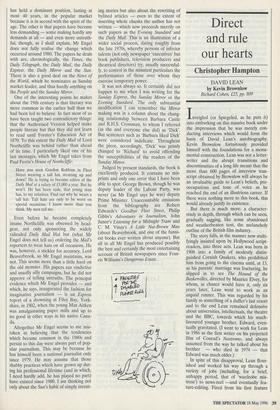Goodness had little to do with it
Alan Watkins
TICKLE THE PUBLIC: ONE HUNDRED YEARS OF THE POPULAR PRESS by Matthew Engel Gollancz, £20, pp. 352 Fr some years now Mr Engel has been one of the most consistently readable per- formers in journalism. He is an ornament to the profession. Though he has done some political sketching, he is, I suppose, best known for his writings on cricket, chiefly in the Guardian. He tells us that writing for that paper is much easier than for the popular press, which is the subject of his book. In the Guardian you are writ- ing for your friends rather than for a lot of faraway people of whom you know little. George Gale started with the Guardian, later had a short spell as editor of The Spectator but spent most of his life at the Daily Express. He held the same view: that popular journalism was harder to bring off than the other sort. Likewise Malcolm Muggeridge, after Lord Cudlipp had come to his rescue by giving him a column in the Sunday Pictorial when he was being shunned and avoided elsewhere on account of his attack on the monarchy.
But though Mr Engel is a Guardian man by long service, he is not really one by temperament, lacking as he does — here I disagree fundamentally with Mr Auberon Waugh in the Sunday Telegraph — that priggishness which is to be found in the paper and often in its writers. This is one reason why the superficially suitable marriage between the Guardian and the Observer has so far proved less than happy. For the latter has traditionally been a worldlier paper, more generous (though, compared to the Daily Mail, say, by no means munificent) with expenses, and employing or having around the place people who are dangerous, louche or virtually certifiable. Far from being a prig, Mr Engel is something of an old cynic. Indeed, he goes too far in his rejection of truthfulness, sweetness and light as possible ingredients of a successful popular news- paper.
Like all good writers, he has a thesis or, rather, two of them. One is that, since the middle of the 19th century a single paper has held a dominant position, lasting at most 40 years, in the popular market because it is in accord with the spirit of the age. The other is that papers have become less demanding — some making hardly any demands at all — and even more untruth- ful, though, as I shall explain, Mr Engel does not fully realise the change which occurred around 1980. The papers he deals with are, chronologically, the Times, the Daily Telegraph, the Daily Mail, the Daily Express, the Daily Mirror and the Sun. There is also a good deal on the News of the World, which he nominates as Sunday market leader, and thus hardly anything on the People and the Sunday Mirror.
One of the interesting points he makes about the 19th century is that literacy was more common in the earlier half than we had been led to believe. In fact most of us have been taught two contradictory things: that the Authorised Version helped make people literate but that they did not learn to read until Forster's Education Act of 1870. To this extent the Daily Mail of Lord Northcliffe was behind rather than ahead of its time. I particularly liked one of his last messages, which Mr Engel takes from Paul Ferris's House of Northcliffe:
Have you seen Gordon Robbins in Fleet Street wearing a tall hat, strutting up and down? He is trying to become editor of the Daily Mail at a salary of £5,000 a year. But he won't. He has been rude, that young man has, to my relatives. Find out why he wears a tall hat. Tall hats are only to be worn on special occasions. I know more than you think. My men tell me.
Even before he became completely insane Northcliffe was obsessed by head- gear, not only sponsoring the widely ridiculed Daily Mail Hat but (what Mr Engel does not tell us) ordering the Mail's reporters to wear hats on all occasions. He was, however, a stickler for accuracy. Lord Beaverbrook, so Mr Engel maintains, was not. This seems more than a little hard on the old monster. His papers ran vindictive and usually silly campaigns, but he did not approve of telling untruths. The principal evidence which Mr Engel provides — and which, he says, inaugurated the fashion for imaginative journalism — is an Express report of a drowning at Filey Bay, York- shire, in 1902, when the young Max Aitken was amalgamating paper mills and up to no good in other ways in his native Cana- da.
Altogether Mr Engel seems to me mis- taken in believing that the tendencies which became common in the 1980s and persist to this day were always part of pop- ular journalism. This may be because he has himself been a national journalist only since 1979. He may assume that those shabby practices which have grown up dur- ing his professional lifetime (and in which, I need hardly add, he has played no part) have existed since 1900. I am thinking not only about the Sun's habit of simply invent- ing stories but also about the rewriting of bylined articles — even to the extent of inserting whole chunks the author has not written — which now proceeds merrily on such papers as the Evening Standard and the Daily Mail. This is an illustration of a wider social process, dating roughly from the late 1970s, whereby persons of inferior talents (not only newspaper 'executives' but book publishers, television producers and theatrical directors) try, usually successful- ly, to control in the minutest particulars the performances of those over whom they exercise temporary power.
It was not always so. It certainly did not happen to me when I was writing for the Sunday Express, the Sunday Mirror or the Evening Standard. The only substantial modification I can remember the Mirror making was in a column about the chang- ing relationship between Barbara Castle and R.H.S. Crossman, to whom I referred (as she and everyone else did) as 'Dick'. But sentences such as 'Barbara liked Dick' were considered indelicate. Throughout the piece, accordingly, 'Dick' was primly changed to 'Richard' to avoid offending the susceptibilities of the readers of the Sunday Mirror.
Judged by present standards, the book is excellently produced. It contains no mis- prints and only one error that I have been able to spot: George Brown, though he was deputy leader of the Labour Party, was never (as Mr Engel says he was) deputy Prime Minister. Unaccountable omissions from the bibliography are Robert Edwards's Goodbye Fleet Street, Philip Gibbs's Adventures in Journalism, John Junor's Listening for a Midnight Tram and C. M. Vines's A Little Nut-Brown Man (about Beaverbrook, and one of the funni- est books ever written about anyone). But all in all Mr Engel has produced possibly the best and certainly the most entertaining account of British newspapers since Fran- cis Williams's Dangerous Estate.



































































 Previous page
Previous page